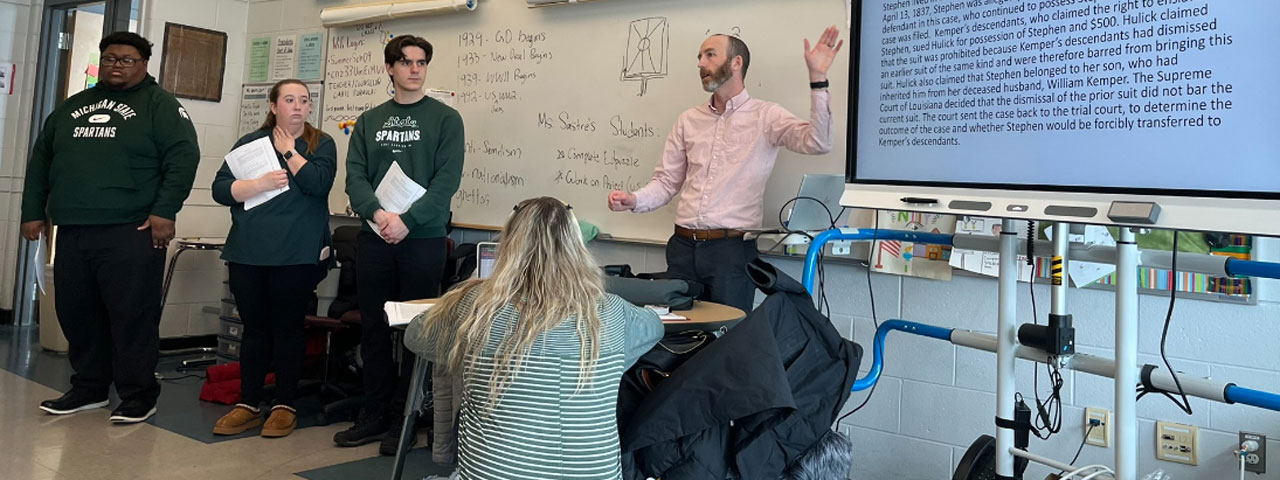College of Law The Citing Slavery Project

The Citing Slavery Project, which has documented the legacy of slavery in the American law system for several years, is expanding to include high school students in its groundbreaking work.
"Slavery is all over the place," Justin Simard, director of the Citing Slavery Project and an associate professor at Michigan State University's College of Law, told NPR in 2023. "Part of the goal of our project is to make sure that influence is accounted for."
Simard and his team of researchers have created a database of “slave cases”—legal cases that involve enslaved persons—and the modern cases that continue to cite them as precedent. Now, the project is expanding to include local high school students, who are able to learn about the judicial system while helping the legal profession grapple with its dark history.
Taylor Hall, a compliance associate at J.P. Morgan Chase & Co. and former student of Simard's, first had the idea to partner with local schools after she became involved with the Citing Slavery Project. Initially, Hall connected with a social studies teacher from her alma mater, Ferndale High School, who agreed to let the team visit his classroom to teach students about the project. “We went and visited some classes, then we brought students [to MSU] to tell them about our project—what precedent is, how citations and cases work, and … racism in the legal profession,” Simard said.
Since then, the team has also established a partnership with Cass Technical High School (Cass Tech), allowing them to include even more high school students.
Taylor Sastre, a social studies teacher from Cass Tech, reached out to the Citing Slavery team after hearing about the project. Hannah Gates, a current law student and former elementary school teacher who was particularly interested in the partnership, also got involved and has since taken leadership over the education piece of the Citing Slavery Project.
Gates and Sastre worked together with Simard's input to design three weekly lesson plans for Cass Tech's AP Government class. Simard and several other team members then traveled to Cass Tech, where the high school students learned about Citing Slavery, talked about citation and precedent, and even contributed to the project's website.
“It was an AP Government class, so it sort of slid in perfectly,” said Simard about the Cass Tech partnership. “They already are reading cases and talking about cases, and this is a way to explain in a little more detail, so it connects to their materials.”
But the students aren't just learning about Citing Slavery—they are putting their skills into practice. “Where the students really really impress me … we gave them a case from our website and had them do their best to work through it and summarize it,” Simard explained. “One of our projects for the summer is actually getting the summaries up on the website. So the students can be part of the project, which is exciting.”
According to Simard, the chance to present their work to high school students has made a significant impact on the Citing Slavery Project team. “Working on the project increases students' confidence, and then practical skills like reading and case analysis. But it also gives them the opportunity to develop other skills, like leadership and organizing,” he said.
“I think a lot of [law] students are really grateful for the path they took to get to law school, and I think helping pave that path for others in the future is important to them, and sharing this work with other people is important,” Simard added. By partnering with local schools, members of the team have the opportunity to show students that law school is a path that is open to them and to share their own success stories.
In the future, the Citing Slavery Project team hopes to publish lesson plans that will allow teachers and students from across the country to access the material at any time. “Ultimately, the goal is to make this more accessible … so that a very busy teacher can come to our website and have these lesson plans to do without us having to be there,” said Simard, adding that the team also plans to establish more partnerships with Lansing-area schools. “Our goal is to really engage with lots of different parts of the community, because we think the way to address the ongoing, persistent legacy of slavery in the law is to change the legal profession.”


